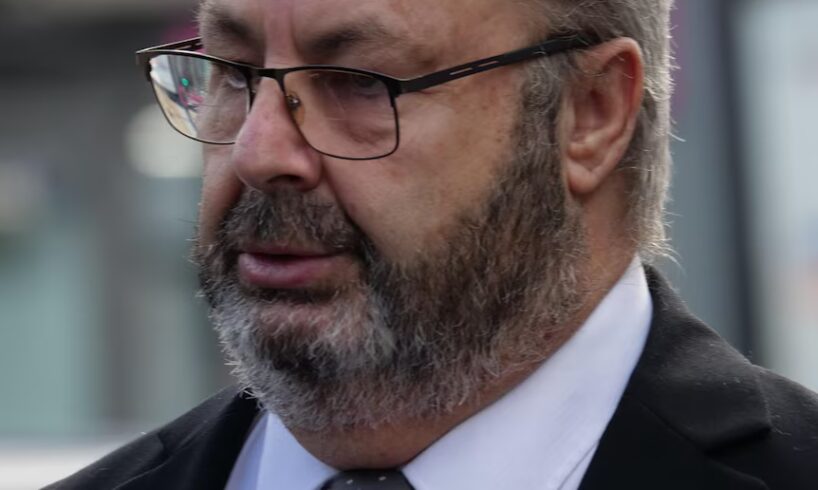
Lawyers for the driver of a bus that crashed in the New South Wales Hunter Valley in 2023, killing 10 people, have told a court the “severe” sentence imposed on their client is “too much”.
Brett Andrew Button is serving a 32-year sentence, with a non-parole period of 24 years, over the crash of the bus carrying wedding guests near the town of Greta.
Button was originally charged with 10 counts of manslaughter, but the charges were downgraded to dangerous driving occasioning death after a plea deal.
He pleaded guilty to dozens of charges relating to dangerous driving occasioning grievous bodily harm, driving furiously and causing bodily harm to survivors.
In the Court of Criminal Appeal sitting in Newcastle on Friday morning, Button’s legal representative Paul Rosser KC outlined three grounds of appeal, with one focusing on the sentence being “manifestly excessive”.
The Court of Criminal Appeal hearing is sitting at Newcastle Courthouse. (ABC News: Jesmine Cheong)
“We submit that a sentence of 32 years for a single act, albeit with catastrophic consequences, is just simply too much,” he said.
The other two grounds for the appeal were that “the sentencing judge erred in finding that the relevant tipping threshold for the bus was 31 kilometres per hour” and “the sentencing judge erred in finding as a fact that the applicant ‘drove knowing that he was under the influence of an opioid painkiller, Tramadol'”.
Sentence questioned
Sally Dowling SC, who appeared for the Crown, said the length of the sentence was appropriate to reflect on the severity and lasting impact of the crash.
She said it was necessary to accumulate the sentence with each offence to recognise the dignity of each victim.
“It was necessary for the sentence to reflect a substantial degree of notional accumulation with respect of each offence, to recognise the dignity of each of the deceased victims and to acknowledge the suffering of each of the injured victims.
“[Also to] reflect the fact that the offences were all the consequence of one single act of driving.”
Families of the victims have built a small memorial garden at the site of the crash. (ABC News: Bridget Murphy)
Ms Dowling also described to the court the ongoing impact of the loss of life.
“There are particular communities in Singleton and regional Victoria that have suffered,” she said.
“The loss of so many young lives through the actions of someone who was engaged to take them safely home.”
Opioid pain medication
Button’s appeal also questioned the sentencing judge’s conclusions regarding his use of tramadol, an opioid painkiller.
“[Button] had at all times in his evidence asserted a belief, a genuine belief, that he was not affected [by tramadol],” Mr Rosser said.
Mr Rosser said Button had a high tolerance to the drug, which led him to increase his dosage previously.
“He had been taking this drug for [some time], and did not believe he was affected by it adversely,” he said.
“That evidence was given repeatedly by him, and he was not challenged as to it.
“He never felt anything in the nature of a high, or a euphoria, it didn’t affect him that way.”
Sally Dowling SC appeared for the Crown in the appeal. (ABC Newcastle: Nakita Jager)
Ms Dowling said there was an “abundance of evidence of [Button’s] knowledge of the effects of tramadol on his driving ability and that he knew he had taken well in excess of the prescribed quantity”.
“[Button] agrees that he was driving in a manner dangerous to other persons in that he was under the influence of tramadol to a degree that there would have been some impairment to his driving ability,” she said.
“So we’ve got knowledge embedded in the agreed facts signed by [Button], combined with the fact that he knew how much he had taken.”
The two-hour hearing concluded with President of the Court of Appeal Justice Julie Ward reserving a judgement to be delivered at a later date.





